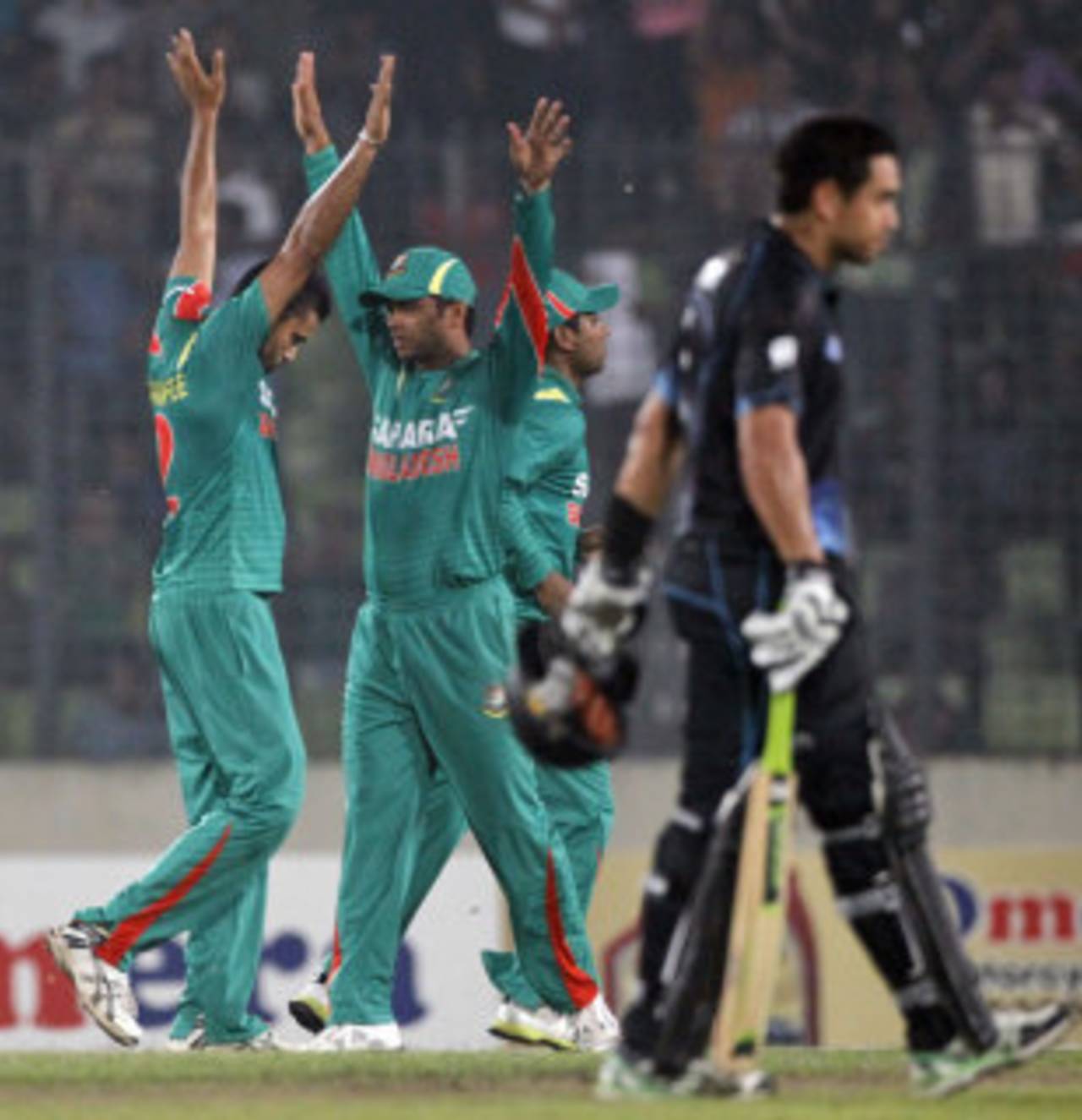Cricket in Bangladesh dependent on political stability
The ACC's decision to retain February's Asia Cup in Bangladesh has been based on the government's promise of providing state-level security during all three major international cricket events from mid-January to early April
Mohammad Isam
04-Jan-2014

New Zealand's tour of Bangladesh was not affected too much by the political blockades, and the players were provided with tight security • Associated Press
The ACC's decision to retain February's Asia Cup in Bangladesh has been based on the government's promise of providing state-level security during all three major international cricket events from mid-January to early April. The BCB has, however, confirmed that they didn't give any political guarantees at the ACC meeting in Colombo, but it would be improbable to assure a stable environment in the country given the volatile political climate.
It is understood that the Asia Cup decision will be vital in convincing Sri Lanka Cricket to go through with their tour of Bangladesh in mid-January, while the BCB would have some strength in convincing other board members when the matter of security comes up for the World Twenty20s in March and April.
"At the meeting, we told the ACC board members that we will provide state-level security for the teams," BCB's acting CEO Nizamuddin Chowdhury told ESPNcricinfo. "They were convinced. There was no talk of any alternate venues. We understand that Bangladesh will be the host of the Asia Cup."
The news comes a day before Bangladesh holds general elections, which are being staged against the backdrop of long-running nationwide violence and are being boycotted by the main opposition parties. The elections, by themselves, are not expected to restore peace in the country and the staging of two other cricket events - a bilateral series against Sri Lanka later this month and the World Twenty20 in mid-March - will be dependent on how much the political forces agree to pull together for those specific time periods.
The Bangladesh Cricket Board is the direct organiser of the Sri Lanka series while the Asian Cricket Council and the ICC are in charge of the Asia Cup and the World Twenty20s. The BCB has formed local organising committees for the two marquee events, including a security team. Senior officials of the BCB held a string of meetings with relevant ministries and security agencies, and put together a security report that was presented at the ACC meeting.
According to sources, the BCB will commit to a three-tiered security detail like the one implemented during the 2011 World Cup. It will make sure all three events have the same levels of security detail, with more involvement of the various security forces at the three World Twenty20 venues.
"The ICC, ACC and SLC will get the same security report, because we are committing to foolproof security for all these events. We have discussed the matter with security agencies in the country, including the Army," a BCB official, requesting anonymity, told ESPNcricinfo.
Ahead of their four-week tour to Bangladesh in October-November last year, New Zealand Cricket had sent a security assessment team in late August. During the series, there was a political demonstration, and strikes, but the tour went on. Only once did New Zealand stay away from training in Dhaka, on the day of a strike. The tour went off peacefully but there was tight security around the players.
While violence has dissipated only slightly in the first few days of January, the opposition party's anti-election and anti-government campaign has not stopped. Blockades and strikes have continued, including a 24-hour strike on the day of the election. Normal life in Bangladesh has been disrupted, as is the case every time there is political violence.
It is believed that the first week after the elections, particularly the tone of the ruling Awami League and the opposition Bangladesh Nationalist Party, will have a bearing on the country's immediate future. There is an expectation among political analysts and international relation experts here that if the tone from the political parties does not soften or take a conciliatory turn, cricket would suffer.
The political movement in Bangladesh, over the past three months has seen consecutive days of blockades. The political strikes and blockades enforced by the opposition parties have amounted to 23 days, while the government itself locked down the capital for two days. There have been nearly 150 deaths due to political violence since late October, and violence has damaged Bangladesh's international image.
Professor Imtiaz Ahmed, a Dhaka-based international relations expert, stated that international players have always been taken care of. He believes that the government has to ensure safety for fans, so that the environment around the matches remains stable. He, however, said that political agitation was unlikely to make way for anyone or anything in Bangladesh.
"The players, historically, have never been targeted," Imtiaz said. "But then we must make sure that the environment is conducive for the public to watch the matches. There might be a hartal [political strike] during one of the matches, for example."
There has, however, already been one dent. The West Indies Under-19 team's pullout in mid-December has clearly undermined Bangladesh. The BCB tried hard to convince the visitors' team management to stay back and shift all matches to Dhaka but that didn't work. Instead, it has created fresh doubt in the minds of cricket officials around the world.
Mohammad Isam is ESPNcricinfo's Bangladesh correspondent. He tweets here